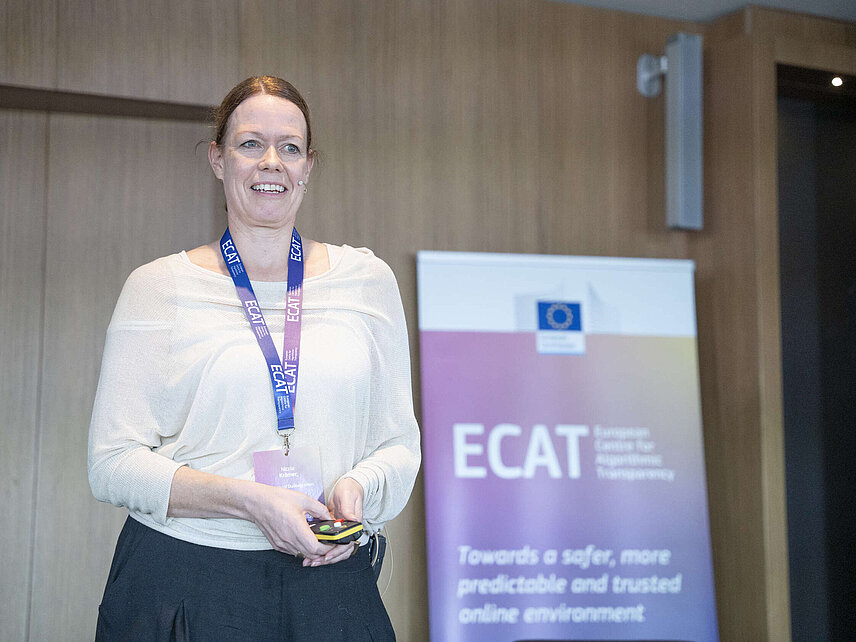16.11.2025
At the ECAT Research Workshop 2025 in Seville Nicole Krämer explored how “agentic AI” is reshaping young people’s lives – and what Europe can do to keep them safe.
 Photo: EU ECAT
Photo: EU ECAT
On 12 November 2025, Nicole Krämer, newly appointed Director of the Research Center Trustworthy Data Science and Security (RC Trust) of the University Alliance Ruhr, delivered a keynote at the ECAT Research Workshop 2025 in Seville, hosted by the European Centre for Algorithmic Transparency of the European Commission. The workshop brought together researchers and policymakers to discuss systemic risks for the mental and physical health of minors in the digital environment, in the context of the EU’s Digital Services Act.
Krämer is Full Professor of Social Psychology, Media and Communication at the University of Duisburg-Essen. For more than two decades, she has been a leading voice in research on human–technology interaction, social media, robots and virtual agents, with a particular focus on how people build relationships and form opinions in digital spaces. In recent years, she has increasingly turned her attention to vulnerable groups such as children and adolescents and how they communicate with AI systems – an expertise that directly informed her keynote in Seville.
In her talk, titled “Agentic AI: Risks and opportunities for young people”, Krämer addressed a technology that is rapidly entering everyday life: AI chatbots and “AI companions” that simulate personal relationships. She outlined central concerns that are currently being debated in families, schools and parliaments alike: Could AI companions discourage children from forming real-life friendships? Might they normalise inappropriate conversations, reinforce harmful stereotypes or provide dangerous advice in moments of crisis? At the same time, she highlighted potential opportunities – for example, AI systems that could help young people practise social skills, provide low-threshold support in stressful situations or make high-quality information more accessible, if designed responsibly.
For regulators, platform providers and civil society organisations, Krämer’s message was clear: safeguarding children in the age of agentic AI requires evidence-based rules, transparent design and continuous collaboration between research and policy. ECAT, as part of the European Commission’s Joint Research Centre, plays a key role in providing the scientific expertise needed to enforce the Digital Services Act and to assess systemic risks posed by online platforms and search engines – especially those affecting the wellbeing of minors.
The workshop in Seville offered a space for exchange across disciplines and generations: established scholars, early-career researchers and students discussed new findings, presented posters and explored opportunities for joint projects. Questions from the audience showed how closely the topic of AI companions touches everyday experiences – from parents worried about their children’s online time to young people trying to navigate friendships, loneliness and digital pressure.
For RC Trust and the University Alliance Ruhr, the invitation to deliver a keynote at this high-level European workshop is both a great honour and a strong signal of trust. It underlines how relevant the Center’s interdisciplinary approach is for current European debates: RC Trust investigates how intelligent systems can be made trustworthy and secure in safety-critical contexts, combining expertise from computer science, psychology, law and the social sciences.
By contributing to the ECAT Research Workshop 2025, Krämer not only brought this perspective into the European policy arena; she also opened doors for new collaborations that will benefit researchers, students and partners of RC Trust alike. Her keynote in Seville shows that the work being done in the Ruhr region on trustworthy data science and security is receiving growing international attention – and that it can help shape how Europe protects children and young people in an AI-driven world.
Category
- Network